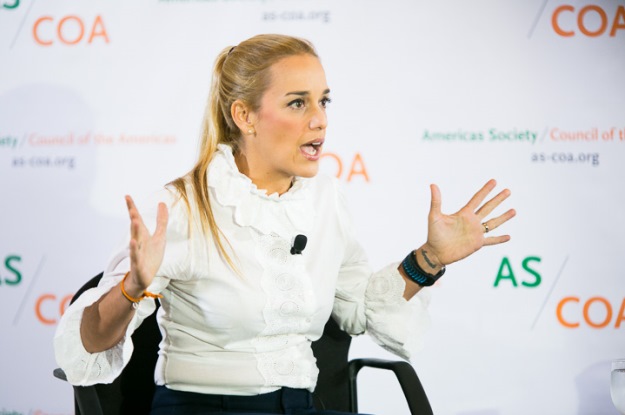In September 2015, a Venezuelan judge sentenced opposition leader Leopoldo López to nearly 14 years in prison for his role in anti-government protests that swept the South American nation in early 2014. On October 1, AQ sat down with Lilian Tintori, a human rights activist and López’s wife, to talk about conditions in Venezuela, her husband’s incarceration and upcoming parliamentary elections.
Americas Quarterly: What’s happened since we interviewed you last September? How do you feel?
Lilian Tintori: The situation has worsened since the last time I was here. Today, we still have 78 political prisoners in Venezuela. If we had an economic, political and social crisis before, today we’re in the middle of a humanitarian crisis. There’s a scarcity of food and medicine, there’s inflation — the highest inflation rate in Latin America — and there is a lot of insecurity. Every 20 minutes, a Venezuelan is killed. The number of violent deaths this past year was 25,000. And 2015 will be the most dangerous year in Venezuela’s history. What we’re living is unfortunate; there is a lack of government autonomy, there’s a lack of rule of law, and according to the UN Committee against Torture, there’s an impunity rate of 97 percent. […] There’s a prisoner of conscience in Latin America. It’s Leopoldo López, my husband. They just sentenced him — unjustly and lacking proof and witnesses — to 14 years in prison. It’s a farce […] and the world is aware of what’s happening in Venezuela. And due to that awareness, we’re asking the international community to help us secure qualified international observers for the next parliamentary elections on December 6. We want to be able to count on the [Organization of American States] and the European Union during this process.
AQ: How is Leopoldo?
Tintori: Leopoldo is strong despite the fact that they’ve tried to break him. They treat him inhumanely and torture him. Leopoldo is alone in a four-story tower. He sleeps in a cell that doesn’t have electricity. They lock him up from 8:00 pm to 6:00 am without a light. They limit his studies, his reading and his ability to write. They’ve stolen his writings and his defense for his trial. In the past month they’ve moved him to a different cell three times to psychologically torture him. And despite all of this, Leopoldo remains strong and asks us for our solidarity. And our form of solidarity is not surrendering. We will not surrender. We will keep fighting for the freedom of all of the political prisoners and we will continue to fight to rescue Venezuela’s democracy.
AQ: What are your predictions for the parliamentary elections in December?
Tintori: Our prediction and our hope is that the Venezuelan people will win. We hope that the people will protest for their vote, that they will peacefully defend their right to vote. We want to be able to count the votes and achieve a change in the National Assembly.
AQ: What role should Brazil and other Latin American countries play in speaking out about Venezuela?
Tintori: The region is key: they’re our brothers, they’re our neighbors. What happens in Venezuela affects the region. We’ve traveled throughout Latin America and have found solidarity and a deep commitment to democracy in the congresses of Brazil, Peru and Argentina. But we need more. We need more support from the international community, and this support can materialize in the next few weeks.
—
This is a translated and edited transcript of an interview that took place on October 1, 2015









